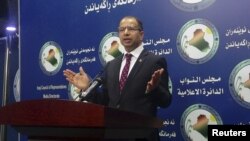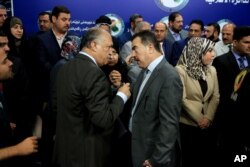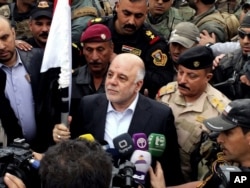Iraqi lawmakers broke into fistfights Thursday as Baghdad plunged deep into a political crisis over how the fractured country should be governed.
The first victim of the scrum appears to have been the outspoken Sunni Speaker of Parliament Salim al Jabouri. But several lawmakers also have been calling for the ouster of Prime Minister Haider al Abadi and even President Mohammed Fuad Masum.
The three are still holding onto their posts, but lawmaker and former national security advisor Muwaffak al Rubaie told VOA their positions “are untenable.”
“Either we have general elections or we go back to parliament and choose a new president, a new speaker and prime minister,” al Rubaie said, adding, “I don’t think new elections are practical now.”
The political eruption comes after months of street protests calling for Prime Minister Abadi to make good on his promises to reform what many see as an elitist system of political cronyism.
“This is the most significant period in Iraqi politics since 2003,” Toby Dodge, consulting Senior Fellow for the London-based International Institute for Strategic Studies.
“Finally, you have the population of Iraq saying to their politicians, ‘You have completely betrayed us, you have let us down’,” Dodge said.
Some politicians are putting forward multiple solutions to avoid an even greater political meltdown.
Veteran statesman and former prime minister Ayad Allawi weighed in, calling onpopulist Shi’ite cleric Moqtada al Sadr and those inside parliament to agree on what he calls a "political road map" to gradually lead the way out of the crisis.
Allawi said Prime Minister Abadi “is going in circles without presenting proper reforms.”
The only way out of the paralysis, Allawi told VOA, was to start reforms gradually, focus on defeating Islamic State, work on political reconciliation and make the parliament fully democratic.
“The key for this road map is to have the legislature operating without any pressures and to empower the Council of Representatives,” he said. “Once the parliament is empowered to do what it should do, to legislate, then all the political players will be satisfied.”
Dodge was skeptical. Protesters galvanized by Sadr last summer to demand change at the pinnacle of the Iraqi state might not be so easily satisfied.
“They have flung a gauntlet down at the seat of the post-2003 political elite, and it’s a challenge that the political elite can’t meet without removing themselves from office and taking away their power and finances,” Dodge explained.
“Senior politicians in the Green Zone talking about something as vacuous and meaningless as a road map to empowering parliament won’t deliver meaningful reforms.”
Dodge added the core of the fight is about much more than cleaning up a vastly corrupt government. It was the start of the post-Islamic State struggle for power in Baghdad between the various ruling Shi’ite factions, he said.
But Kenneth Katzman, an Iraq expert at the Congressional Research Service in Washington, D.C., believed the bedrock of the current crisis is the dramatic fall in oil prices that has left the Baghdad government without any real resources.
Although the average Iraqi is suffering, Katzman said, the political class in Baghdad has been living a parallel life of tremendous privileges, good salaries, and protection that they do not want to give up.
“The politics flows from that. Abadi has been weakened politically because of these demonstrations that show his government to be ineffective, and then various Shia politicians are using his weakness to bolster their own fortunes,” Katzman told VOA.
The result, Katzman said, could be very destabilizing. Abadi has already pulled some military units back from the front lines against Islamic State into Baghdad to shore up his government.
“You could get a petition in parliament for elections or an extra-constitutional putsch by a Shia commander or by Sadr. You could get the Sunnis pulling out entirely,” he said.
But Baghdad’s leadership has pulled back from the brink before. And Iran, which wields a strong influence over Baghdad, is unlikely to support any move that would lead to outright instability.







